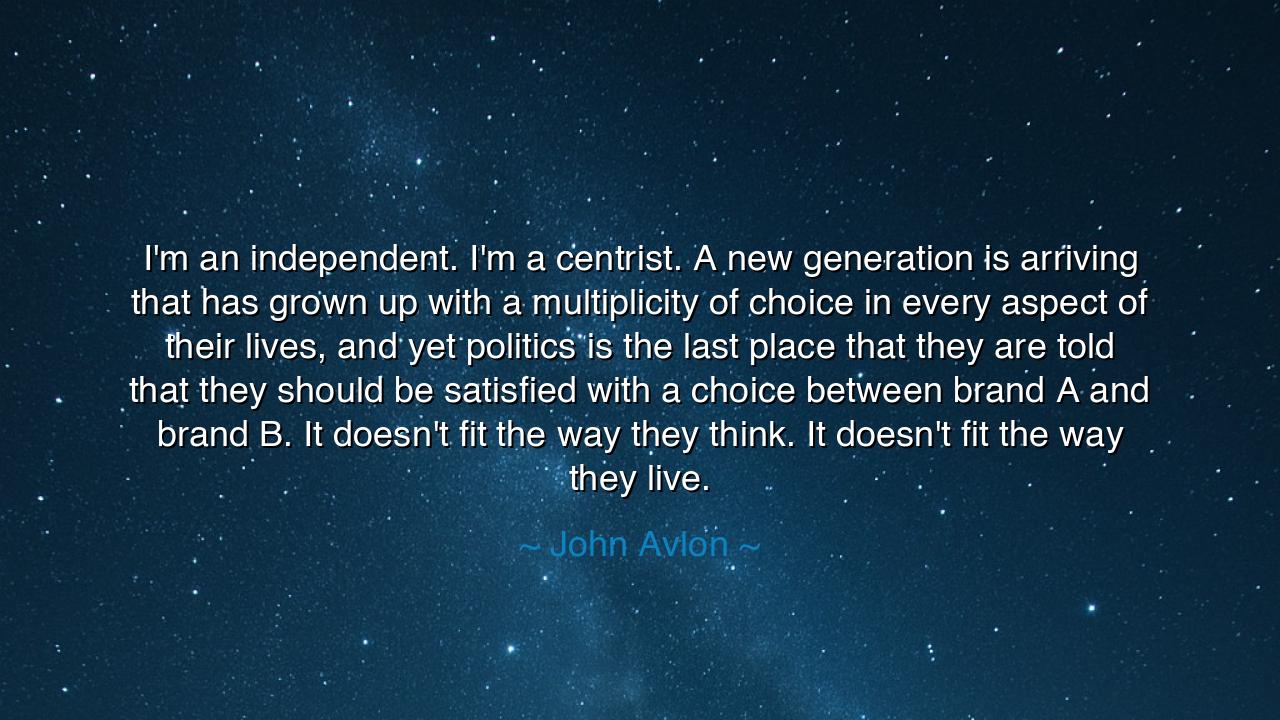
I'm an independent. I'm a centrist. A new generation is arriving
I'm an independent. I'm a centrist. A new generation is arriving that has grown up with a multiplicity of choice in every aspect of their lives, and yet politics is the last place that they are told that they should be satisfied with a choice between brand A and brand B. It doesn't fit the way they think. It doesn't fit the way they live.






The words of John Avlon, “I'm an independent. I'm a centrist. A new generation is arriving that has grown up with a multiplicity of choice in every aspect of their lives, and yet politics is the last place that they are told that they should be satisfied with a choice between brand A and brand B. It doesn't fit the way they think. It doesn't fit the way they live,” are a cry for renewal. He reminds us that politics, bound by rigid parties, often lags behind the spirit of the people it claims to serve. In an age of freedom and diversity, where choice abounds in markets, culture, and thought, why must the citizen be forced into the narrow prison of two banners?
The ancients understood this yearning. In Athens, the birth of democracy was not meant to bind men to rigid factions, but to give voice to the many. In Rome too, when the Republic was young, citizens could seek leaders among a wide array of voices, not merely between two hardened camps. Avlon’s words reveal that the spirit of independence is not rebellion against politics itself, but a call to restore its original vitality—to make it fit the way people live, dynamic and diverse.
History gives us powerful witness. In the early days of the United States, men like George Washington warned against the tyranny of faction, fearing that rigid parties would choke the nation’s freedom. Washington himself refused allegiance to any single party, believing that the health of a republic required flexibility, wisdom, and the courage to walk the center when extremes threatened to divide. His example stands as a mirror to Avlon’s declaration: that to be centrist is not weakness, but fidelity to unity and balance.
Avlon’s words also echo the struggles of our age. A generation raised in a world of boundless choice—in education, in technology, in culture—finds it unnatural to accept only two avenues in the realm that governs their lives. They hunger for voices that reflect the complexity of their experience, for leaders who transcend the stale quarrels of brand against brand. Their rejection of narrowness is not apathy, but the sign of a deeper wisdom: that life itself cannot be contained in two boxes.
Let this teaching be passed to the generations: politics must evolve with the people, or it will wither in irrelevance. The true servant of the republic is not the one who clings to a single banner, but the one who dares to walk the path between, drawing wisdom from many sides. For to be independent is to honor the freedom of the mind; to be centrist is to honor the unity of the nation. And as Avlon declares, the way we live and think demands nothing less.






TTDo thi thanh thao
On a practical level, how should an individual who rejects rigid camps act between now and the next election? Tactical options might include backing ranked-choice initiatives, participating in open primaries, supporting fusion voting where legal, and prioritizing local races where nontraditional alignments are feasible. Are ballot measures and city councils the best beachhead for pluralism? What accountability tools—scorecards, transparent coalition agreements—help independents convert preference into leverage without enabling spoilers or gridlock?
GDGold D.dragon
There’s a risk that “the center” becomes a moving label for status-quo preferences. Who defines it—the median voter at a given moment, or a principled synthesis across issues? When rights and power imbalances are on the line, compromise can entrench harm. How do centrists maintain moral clarity while resisting tribalism? I’d value a framework for distinguishing creative coalition-building from bothsidesism, and for deciding when a firm stand is warranted versus when incrementalism serves the public better.
TVTran Tuong Vy
Thinking like a civic entrepreneur: if the political marketplace is misaligned with contemporary habits, what product innovations would actually help? Modular policy bundles? Issue-based memberships that federate into coalitions at election time? Citizens’ assemblies that inform slates? Could “liquid democracy” or open-source platforms lower the cost of forming pragmatic alliances without requiring a full-blown new party? I’m looking for concrete prototypes that preserve flexibility for voters while still yielding clear mandates and accountability for officeholders.
MPTran Thi Mai Phuong
As a millennial, I resonate with the desire to escape rigid labels. But surveys often show “independents” lean consistently left or right when pressed. Are we confusing brand fatigue with ideological moderation? And for younger cohorts raised on algorithmic feeds, is life truly about more choice—or about curated funnels that feel personalized? I’d appreciate a data-driven take: do self-described centrists and independents behave differently at the ballot box, or mainly in how they narrate their political identity?
PMNguyen Phuong My
I’m uneasy with the consumer analogy. Shopping thrives on infinite varieties; governing requires durable coalitions and compromises that can pass budgets, not just express preference. How do we avoid a fragmentation trap where more labels produce fewer results? Is there a healthy middle ground—say, a few more parties paired with mechanisms that force coalition agreements quickly? Also, does expanding choices risk empowering narrow factions with veto power? I’d like a perspective on balancing pluralism with governability.